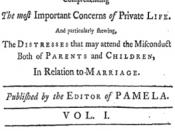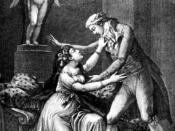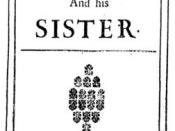Emily Zaremba
Professor Matthew Garrett
American Revolutions and Counterrevolutions
24 April 2014
18th Century Women's Epistolary Novels: A Revolution in Literature
17th century Britain saw an intellectual movement that precipitated the emergence of distinct public and private spheres in society, where women experienced "a separation out of" the economic market, followed by an "extreme interiorization" into domesticity (McKeon 151). This shift towards modernity caused the public to place greater value on individualism, and people turned to letter writing as a means to express their subjective experience. Women's disenfranchisement during the 17th and 18th centuries prompted female authors to adopt the epistolary style in novels to enact their romantic fantasies and temporarily escape the isolation they felt inside their homes (Perry 14). These intellectual movements also caused the public to seek autonomy from despotic government through a series of revolutions in the 18th century, inspiring female authors to similarly seek independence from patriarchal societies by drawing attention to women's subjugation in their epistolary fictions (McKeon 471).
In Hannah Foster's epistolary fiction, The Coquette, she offered a new account of Elizabeth Wharton's life that defended Eliza from her depiction in the media as a "fallen woman", and shed light on a British society that forced constraining notions of virtue onto women and prevented them from pursuing endeavors outside of the domestic realm ("The Coquette" 11). In Secret History; or, The Horrors of St. Domingo, Leonora Sansay performed a textual inheritance with Foster by reimagining Eliza's story in Haiti during the tail end of revolution to illustrate the universal oppressive state of women in the age of modernity, and offer a means of resistance by creating an independent women's epistolary genre and infiltrating the male-dominated publishing world.
In Secret History of Domesticity, Michael McKeon analyzes the movement from tradition...


